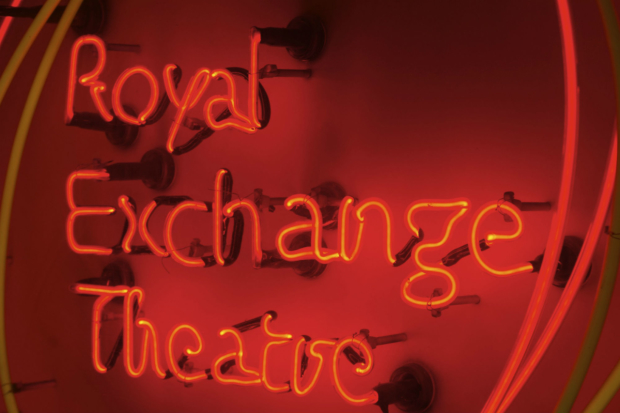Regional Theatre Focus: the Royal Exchange has been shaped by the people of Manchester
As part of our Regional Theatre Focus, playwright and Manchester resident Joshua Val Martin explains why the Royal Exchange should become the official centre point of the city

© socialBedia/Flickr
The Royal Exchange Theatre sits next to St Ann’s Church, and it is the church tower that marks the official centre point of the city of Manchester. But I think the Royal Exchange should take that title, as over the last two hundred years, it has been a building and community that has shaped, and also been shaped, by the people of Manchester.
In 1764 the Duke of Bridgewater cut the world’s first man-made canal, and this propelled Manchester into becoming the world’s first industrialised city. Synonymous with textile production, at one point Manchester accounted for eighty per cent of the world’s finished textiles. A textile trading exchange was essential. Whilst inside the building wealthy men traded in textiles made from cotton that would have been picked by slaves, outside angry Mancunians used the building to campaign, even setting fire to the building in 1815. Friedrich Engels worked here as a capitalist by day, funding Marx to write the communist manifesto by night. In 1921, the Royal Exchange was the biggest trading room in the world.
The building was badly bombed in the blitz of 1940 and consequently Manchester’s economy went into steady decline, with the Royal Exchange closing in 1968, chiming the end of the city’s industrial era. Like post-industrial Manchester, the exchange is left empty to decay. As a prologue to Manchester’s cultural regeneration, in 1976 the Royal Exchange Theatre arrives in its iconic spaceship module, equipped with 755 seats, making it the world’s largest theatre in the round. On 15 June 1996 the largest bomb to go off in peacetime Britain was detonated by the IRA in Manchester, and the Royal Exchange was badly hit.
Royal Exchange Theatre is proudly and quintessentially Manc – and that’s what works.
Like the city of Manchester, the Royal Exchange Theatre responded by returning stronger than before, complete with a refurbishment and a new studio space. I initially felt uncomfortable with the term ‘regional’ when referring to the Royal Exchange Theatre – after all, this is a building that runs Europe’s biggest playwrighting prize, producing work that sits happily next to the so-called national venues of the Royal Court or the National Theatre. However, upon further thought, the Royal Exchange Theatre is proudly and quintessentially Manc – and that’s what works. The theatre’s leading ladies, for example, are both local lasses – with long histories of empowering and supporting the people of Manchester – as well as offering powerhouse performances in recent seasons (Maxine Peake in The Skriker and Julie Hesmondhalgh in Wit).
And it’s a two-way street:
Brink by the Young Company was one of the most striking productions of last year. The Elders Company’s work in the Great Hall left me in tears. Manchester’s ongoing problem with homelessness is being addressed with a continuing working relationship with the Booth Centre. I’ve personally benefited from the Arts Pot, which ensures no one is excluded for financial reasons. Recently appointed Associate Artistic Director Matthew Xia founded the Open Exchange Network, which offers workshops, rehearsal space, performance space and paid opportunities to over five hundred (and counting) emerging local theatre makers. Upcoming productions will tell stories from the communities of Manchester that have yet to have had adequate representation on our stage, including collaborations with Talawa, Graeaeand an adaptation of The Mighty Walzer. Of course, a lot of people simply use the Royal Exchange Theatre for the toilets, the free internet and to chat with our volunteers known as The Friends, who are always on hand to show you around the building, and offer information.
The Royal Exchange of today is a far cry from the Exchange of white men in top hats trading textiles. This is a space that ever increasingly reflects and includes Manchester. This is a space for Manchester.
Today, the Royal Exchange trades in words and thought: it is a cultural church in which industrial Manchester and post-industrial Manchester kiss to power the regeneration of the city. Watching a play in the module, one can concurrently observe the neoclassical columns beyond the glass walls of the module, as well as fellow Mancs opposite perhaps laughing and perhaps crying at the drama unfolding upon the stage: you’re suddenly very aware of the past and the present and the possibilities that the future holds.
Joshua Val Martin is a playwright and theatre director from Manchester. He is also the founder of Free Manchester Walking Tours.













